Milestone: First week back to work is finished.
Monday night I posted “Grief is like the Ocean” and described the progress I’ve made through this whole grief process. Then, Tuesday morning came, the tide rose, and waves crashed over my head relentlessly. I knew they would eventually overwhelm me again … I just didn’t realize it would be so soon.
I began to panic about 10 minutes out and then felt almost paralyzed as I approached the front door to my office building, not knowing exactly what to expect but assuming it would be a difficult day. Thankfully, a friend rescued me just as I was about lose it and offered me her shoulder to cry on (and then found me a hiding place to retreat to). Isn’t God great in that He gives us exactly what we need at the exact moment we need it!?
What I’ve learned from this week is that there are three (generalized) responses towards a person who has experienced a traumatic loss:
1. There is the person who doesn’t know what to say so they just avoid you all together
2. Then, there’s the person who wants to say something but they don’t really know what to say. They don’t want to say something to upset you so they keep it short and avoid any reference to what’s happened. They keep their distance like you have a 5-ft force field all the way around you that can’t be penetrated.
3. Lastly, there’s the person who knows there is nothing they can say to make your pain and sadness any better so they just hug and encourage you without fear of the emotions it might evoke … and they do it often!
(Note: You will most likely experience someone who is unaware of your loss … it’s not their fault so don’t be upset with them.)
All three responses come from people who feel bad for what you’ve experienced. They can’t imagine going through what you’ve just gone through nor do they think they would ever have the strength to live through something so devastating. In fact, until that individual has personally experienced the loss of a loved one it’s really hard to understand what it’s like for you or relate to you at all.
So, what should you say to someone who’s gone through a traumatic experience like losing a child? Nothing profound … maybe “I’m praying for you,” “I’m sorry,” “I love you,” “I’m here for you” … and leave it at that. Don’t feel like you have to say anything special. They don’t expect, or want, you to have the answers. Just show your support and love for that person.
What should you do? Hug them (you’ll know if that person is not the hugging type) but I am, so that’s always my answer 😊. It shows that you care and that you haven’t forgotten about their pain.
In reflecting over the past 10 weeks, I didn’t realize I had been inside this little bubble. I have been surrounded by people who are intimately involved in our lives and our experience with Andrew. When I stepped outside of that bubble I was met with the reality that life has continued on for the rest of the world. The feelings and emotions I have been dealing with started over in a way, because new people have entered my bubble. Maybe part of the grieving process is slowly allowing more people back into your life and learning to face the devastating feelings over again – hopefully getting a little easier each time.

